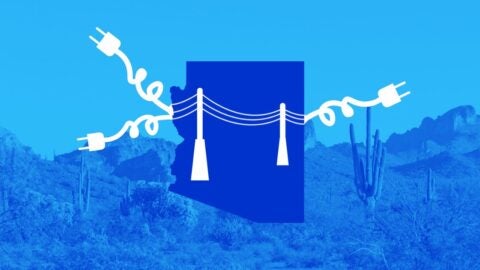Lesson from The Climate War: the missing ingredient is presidential leadership
This was originally posted on the California Dream 2.0 blog by Jennifer Witherspoon.
An interview with editor and author Eric Pooley
Tonight, Eric Pooley, deputy editor at Bloomberg Businessweek, will join the Environmental Defense Fund at our San Francisco office to celebrate the release of his new book, The Climate War – True Believers, Power Brokers, and the Fight to Save the Earth.
California Dream 2.0 took the opportunity to interview Mr. Pooley about the book, which features EDF President Fred Krupp and Duke Energy CEO Jim Rogers and chronicles their efforts — along with other leaders of the U.S. Climate Action Partnership, Al Gore and the Alliance for Climate Protection, and many others, to pass national climate and energy legislation.
Q: When did you first get the idea for the book?
A: In the early spring of 2007, I wrote a cover story for Time magazine about Al Gore. Speculation was that he might be considering another run for president, following the major successes of An Inconvenient Truth. As I reported it I saw that the debate was finally changing from climate science to climate politics — from whether climate change was happening to what we were going to do about it. And I got interested in what was causing America to drag its heels on enacting comprehensive climate and energy reform.
Q: What did you discover?
A: I didn’t come into this as an environmental journalist. I came to this as a political correspondent and the editor of a business magazine, Fortune. So I began to do a lot of research and what I discovered was that solutions existed and were being refined and improved. These policies had their roots in the 1980s, and that is where I got acquainted with EDF, which as you know has advocated for these market-based ideas since the Clean Air Act amendments of 1990, which imposed a mandatory declining cap on sulfur dioxide pollution from power plants. So I decided to write a book about the battle over climate action — the people at EDF and elsewhere who were trying to get these ideas signed into law — and people on the other side who were trying to keep it from happening.
It is no easy feat to transform the entire energy & industrial complex of the United States. I think that the market-based ideas behind the declining cap on carbon and the emissions trading program that was in the original Lieberman-Warner bill and was approved by the Waxman-Markey bill in the U.S. House is the best chance we have right now to address climate change. How that bill got passed a year ago is sign of what is right with the U.S. political system; it shows politics doing what politics are supposed to do, addressing economic imbalances and cushioning consumers and carbon-intensive industries from rising costs.
Q: In light of the Gulf oil spill do you think the U.S. Senate will pass a climate bill this summer?
A: When I started the book three years ago, I had hoped that the narrative would start with the U.N. climate conference in Bali and end in Copenhagen. But as President Bill Clinton said, what the global warming story “doesn’t have is an ending; that part is still up to us.” I hope the Senate will act this summer. This is a big week right now, as President Obama meets with senators from both sides of the aisle to discuss what should be in a climate and energy bill.
I think the American people will get behind the idea of a carbon cap, but they need to understand it first. It can’t be forced upon them. That’s why we need President Obama to use the tragedy of the Gulf oil spill as a great teaching moment – now is the time for America to accelerate the transition to clean energy. Obama has the ability to explain how a cap on carbon will unleash America’s clean energy market, but his recent Oval Office speech was a disappointment, missing a major opportunity to explain the need for the carbon cap to the American people.
China is already ahead of America, spending nearly 9 billion dollars a month on clean energy. America is a decentralized, debtor nation. We can’t rely on the government to make those kinds of investments and create industries by decree. We need a market to do it. The government can pass smart policies, like the cap on carbon, to spur America’s ingenuity and draw private capital off the sidelines. America needs a market to compete with China and other nations and that’s what the Senate could provide this summer. But the senate won’t do it unless Obama makes the case forcefully and in a sustained way. The lesson of The Climate War is that presidential leadership is the necessary, and until now missing, ingredient.
Q: I’m sure you’ve heard about California’s cap on carbon, AB 32, the Global Warming Solutions Act and new efforts by out-of-state oil companies to roll back that law?
A: I cover AB 32 briefly in The Climate War. It was a real victory for California to pass the nation’s first climate cap. It is a shame that some would try to delay our future until some perfect moment. We need to move into the future with confidence. Business people understand that and that’s why so many of them support AB 32. We need to treat voters like grown ups, however, and not try to sweep the costs of transitioning to clean energy under the rug. There are short-term costs, but the benefits are greater down the line. After writing the book, I still don’t know if our political system will rise to the challenge. I just know that the time is now and that the president needs to lead.












